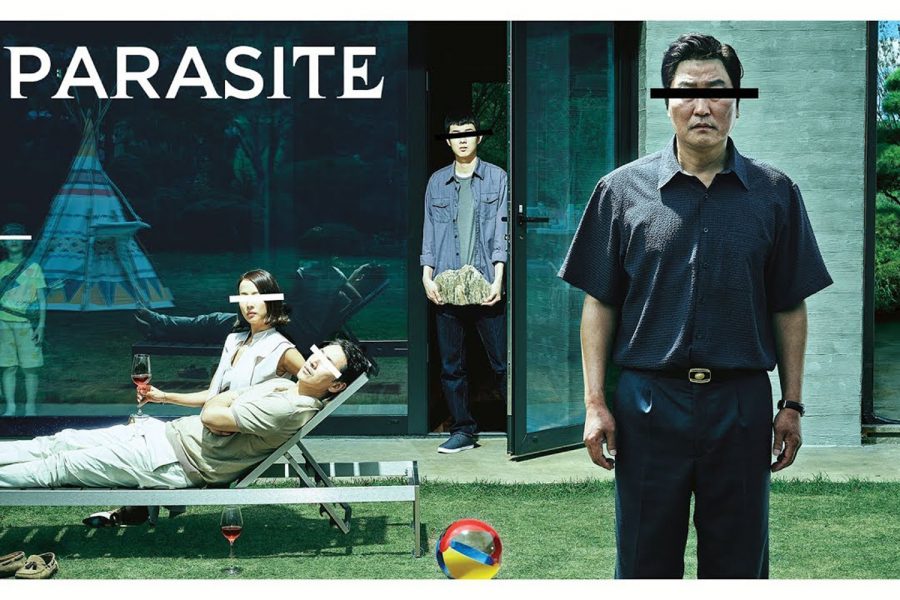Review: South Korean film ‘Parasite’ touches on subjects of class, symbolism
“Parasite” which premiered in 2019, has gained international respect nominated for six oscars and winning four. Promotional poster by Barunson E&A.
June 7, 2020
“Parasite,” a film directed and produced by Bong Joon-ho, made multiple headlines after winning Oscars for Best Picture, Directing, International Feature Film and Writing for Original Screenplay). Not only did it make headlines for winning four Oscars, but it is also the first non-English film to win the Best Picture award.
The film begins by introducing the audience to the Kim family with the two parents, Ki-taek, the father, and Chung-sook, the mother, along with son Ki-woo and daughter Ki-jung. The family is of low-income, struggling to find a way to make enough money to maintain themselves. When their current job of folding boxes for a pizza shop fails, Ki-woo is presented with a new job of tutoring a sophomore girl in high school.
The Parks, the family of the sophomore girl, are very wealthy and in search of an art tutor for their youngest child, a job taken by Ki-jung. When the siblings both officially become the new tutors of the children, they see an opportunity to make even more money. They devise plans to get the current workers of the Park family out of the way and to place their entire family into the Park home with he mother working as the maid and the father as the driver. What they didn’t expect was for Moon-gwang, the prior maid they get rid of, to come and completely change their plans. From here on, a war between the family and the maid develops and the Kim family does whatever they can to get the previous maid out of their way so as not to be exposed for their trickery. It doesn’t matter what they do because they need the money, right?
The theme is clear from the beginning — the sharp division between classes. The people who desperately need the money and the people who have it all but are taken advantage of by the poor due to their ignorance. But, as the plot develops, one begins to wonder — who is the real parasite in this scenario? Bong Joon-ho ultimately challenges the idea of which socioeconomic classes are really parasites.
The film is completely unpredictable, the embodiment of a roller coaster with deep emotions and shocking events. It begins as a bit of comical and sweet story but then turns into a war between class with no limits. Everyone ‘fakes it until they make it.’ Once it sunk in on me, I felt heavy and my mind was rushing with thoughts, the main one being the realization that all the families were invasive towards each other. Neither economic class was the ‘bigger’ parasite as they both benefit from each other by taking whatever they need at the other’s expense. They were all parasites.
Bong Joon-ho most definitely highlights the juxtapositions between the characters’ families. The poor conditions the Kim family lives under are shown from the beginning of the film but later on viewers meet the Park family. The Park family has a house designed by a famous architect as well as anything they want and more. As the plot unraveled, I dismissed these differences as something typical of a film of this sort and if I am being completely honest, I didn’t take into account the fact that it was rated R. My only knowledge of the film came from the description provided by Amazon Prime. I wasn’t prepared at all for the film to so deeply explore the complicated issue of class, especially with such strong moments of violence.
In terms of visuals, the production quality was great. The lighting and settings both complement the plot and contrast the tone of the scenes. For example, towards the end of the movie, everything has gotten out of control for both families, yet it is a sunny day — the grass is bright green, and the guests’ clothing is colorful and simple. Bong Joon-ho is making a statement: everything could seem to be perfect yet take a turn at any given moment. In other words, anyone’s world can easily be destroyed at any time no matter the circumstances. Some lighting made the clips look warm and inviting, while others created some suspense in scenes. Overall, the entire film was thoroughly planned out, and got straight to the point.
Bong Joon-ho’s film is definitely explicit but that’s sometimes what we as humans need to see. Something that isn’t sugar-coated can help us understand the gravity or levels of issues around the world. Sometimes it’s necessary to see it acted out because that’s when we realize there is more than what meets the eye. “Parasite” deserves the Oscars it received and all the attention it’s getting around the world. It opens doors to a difficult conversation and is not afraid to do so.
Watch the trailer here.
-
Story
-
Acting
-
Technical Quality
-
Enjoyment
-
Impact
Summary
“Parasite” is an achievement by South Korean film director Bong Joon-ho. This internationally renowned combined thriller and comedy makes the viewer question who the true parasite is.










Hannah Kim • Jun 10, 2020 at 12:06 pm
Amazing film!! Definitely an all-time favorite!!